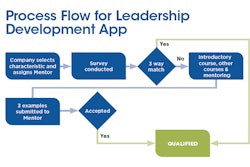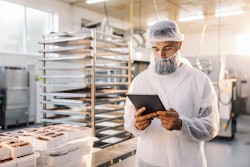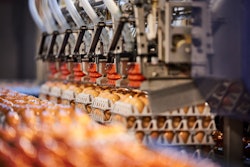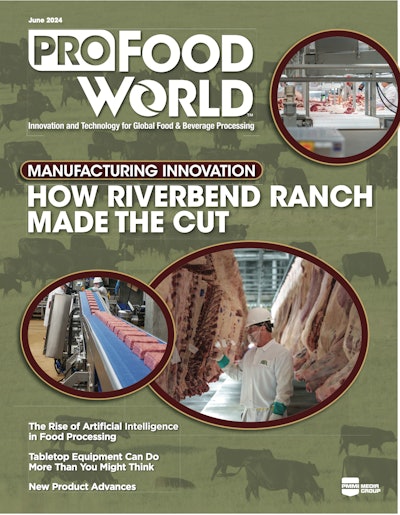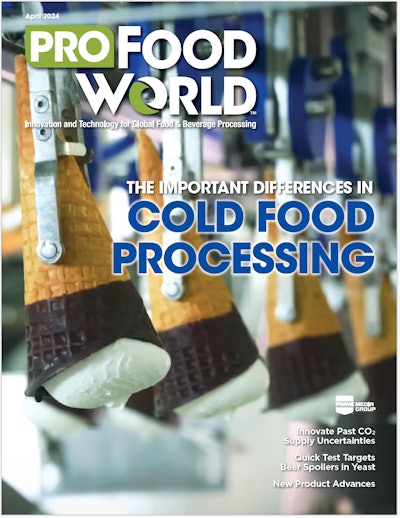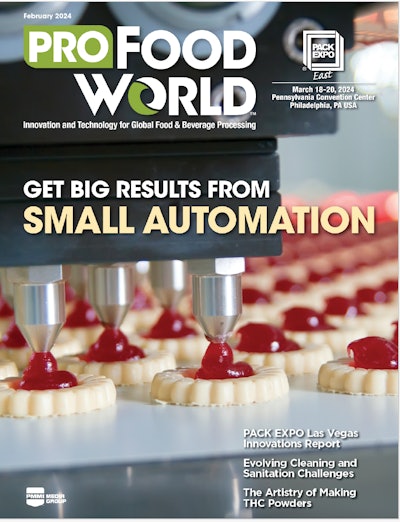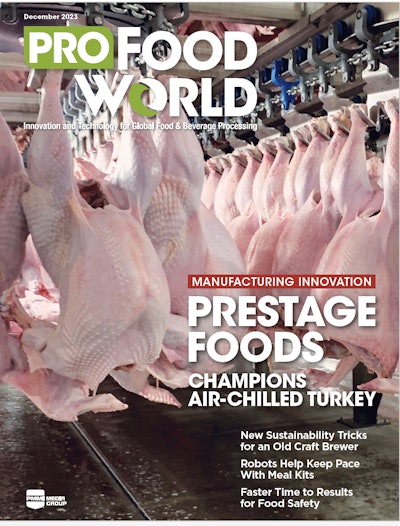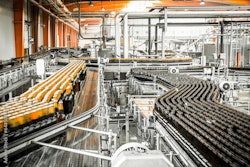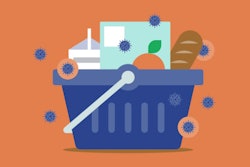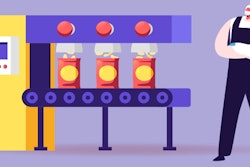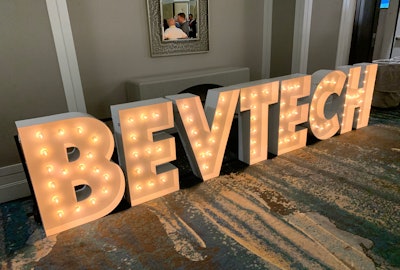
Artificial intelligence (AI) took center stage this week at BevTech—not only because it was the dedicated topic for sessions on the Monday morning schedule but because it seems to be difficult for any forward-looking discussion not to include AI. Whether focused on supply chain, sustainability, or innovation in general, AI—and its buzzy offshoot generative AI—has become an indispensable consideration for the tools shaping progress.
An annual conference held by the International Society of Beverage Technologists (ISBT), BevTech’s experts saw many reasons to be optimistic about AI, regardless of the hype. They also saw reasons that you best not ignore it.
AI’s hype and learning curve
 Todd Dolinsky, chief product officer, TrustwellAaron Hand
Todd Dolinsky, chief product officer, TrustwellAaron Hand
Artificial intelligence currently sits at the tippy top of the Peak of Inflated Expectations, according to the Gartner Hype Cycle. “Something’s going to bring us off that peak. People are going to find reasons to be skeptical of generative AI and AI in general,” says Todd Dolinsky, chief product officer at Trustwell, which has platforms geared toward compliance, transparency, and quality in the food industry. “But the one difference [from other technologies on that curve] is it’s getting better very, very, very quickly.”
This is because every time we use AI, it’s also learning from us. Instead of the many years and iterations it took iPhones to get where they are today, the cycle for AI is months, not years, Dolinsky told attendees at BevTech. “That pace of AI innovation, that timeline is only shrinking,” he says. “With that in mind, you all should be using AI today—personally and professionally.”
 Gartner
Gartner
Some key applications in the beverage industry:
- Flavor and ingredient formulation. AI can develop flavors not yet known to humanity.
- Production efficiency and quality control, optimizing production schedules.
- Sustainability and environmental impact, being able to predict behaviors to help factory floors run as efficiently as possible.
- Predictive maintenance, understanding where there might be flaws so you can take a system down to prevent wider outages.
These are all good places to get started, Dolinsky says.
AI’s iterative journey
 Scott Figura, managing director for the Americas, LineView SolutionsAaron Hand
Scott Figura, managing director for the Americas, LineView SolutionsAaron Hand
When Scott Figura began in this industry as a lowly line worker at PepsiCo, he was told that as long as he could make 1,000 cases an hour, he’d be a hero. Not much more guidance than that. But with AI, companies can give their employees the intelligence and technologies they need to drive better decisions.
“AI’s going to transform our industry more than anything,” asserts Figura, managing director for the Americas at LineView Solutions, which provides smart factory solutions and operational expertise. Companies throughout the industry recognize that they need to do AI, even if they’re not exactly sure what to do with it yet or the data that they’re already gathering. “About 70% of businesses are actively engaged in trying to figure out what that means to them and how they can use what they do have.”
The beverage industry faces more challenges today than it did 5, 10, or 30 years ago, Figura says. You’re faced with challenges in digital transformation, data management, and predictive analytics. “How do you use the information that’s so critical in our business to drive actions?” he asks, pointing to struggles to find the right talent and the right technologies. “How can artificial intelligence help us to bridge that gap to what we have and what we know today?”
The answer could well be AI, which can provide the insights to get you to the right answer faster. It’s important to note, though, that if you have the wrong data, AI can also get you to the wrong answers faster than ever.
Figura is nonetheless optimistic. “We can get the information and understand it and get it connected to our employees and to our operators. That’s what’s going to take all organizations to the next level,” he says. “We certainly have challenges more than ever, but we have a way to get there. And this is all about providing sustainable performance to our organizations, to our clients, to offset some of those challenges we’re faced with.”
It will require figuring out how to efficiently bridge legacy systems with new technologies to make information sharing more practical. “There’s no shortage of information, there’s no shortage of data,” Figura says. “But how do we start to bring that information into systems to connect the dots?”
Like everything in digital transformation, AI is an iterative journey, Figura reminds listeners. His recommendation is to get started. “People are already doing things with AI,” he says, mentioning more traditional technologies such as machine learning, robotics, and data analysis. “Those are foundational elements to what we need as an industry. You don’t just jump to the next level; you have to have the foundation.”
The importance of structured data
 Geert Van Kempen, head of food and beverage strategy, Veeva SystemsAaron Hand
Geert Van Kempen, head of food and beverage strategy, Veeva SystemsAaron Hand
The ability to effectively use artificial intelligence in your operations depends heavily on the integrity of your data, notes Geert Van Kempen, head of food and beverage strategy at Veeva Systems, which provides cloud-based quality and regulatory solutions. With a focus on the use of AI in hazard analysis and critical control points (HACCP) applications, he urged BevTech attendees to take a more structured approach to data.
“High-quality data is really an enabler for using AI,” Van Kempen says.
To showcase this, he used ChatGPT—a more generic application of generative AI capabilities—to generate a HACCP plan. “If you read through the answer, it makes sense, but it’s generic,” he says. Though there’s a lot of general knowledge in the public domain on food safety and HACCP, it’s not specific to a particular production line. “So, can we get AI applications to be much more specific to your particular environment, to your particular content? And what does it take to get there?”
If you could apply AI to specific use cases, Van Kempen says, there are several meaningful applications within HACCP:
- Creation of HACCP plans
- Sense checking of HACCP plans
- Comparisons across HACCP plan portfolios
- Hazard risk assessment and alerting
- Monitoring of critical limit failures
For all of these applications, “we believe that they really get to life if you can feed those AI models with high-quality data,” Van Kempen says. Getting high-quality data means transferring the knowledge that’s currently in documents, spreadsheets, flow charts, etc., into a more structured data approach. The data that’s locked into spreadsheets and other types of documents is not usable to train AI.
Veeva has been working with Nestlé to help the food giant standard its data in a digital system to provide visibility across all assets in all locations. They have seen several benefits, according to Van Kempen. “We see the ability to really compare across asset plans to have visibility, to easily report where significant hazards are being identified,” he says. “Are they the same? Are they managed in a similar way? What type of control measures are associated to those significant hazards? That is driven by data standardization.”
Many of Veeva’s customers manage a portfolio of HACCP plans, Van Kempen notes. “When you can bring all those HACCP plans out of the documents into a single system, then reporting, dashboarding, all kinds of data analysis, is unlocked with that. It comes on the fly,” he says. “And we are able to have multiple HACCP plans in one system to do real-time reporting on any critical event.”
AI for the win
 Chris Gaffney, managing director of the Supply Chain and Logistics Institute at Georgia TechAaron Hand
Chris Gaffney, managing director of the Supply Chain and Logistics Institute at Georgia TechAaron Hand
Artificial intelligence is one of several technologies that the beverage industry will have to figure out how to make best use of as it marches further into digitalization of its operations. Along with AI, digital twins, augmented reality, virtual reality, advanced analytics, blockchain—the list goes on—could be daunting, perhaps intimidating, says Chris Gaffney, who presented Wednesday morning’s keynote on supply chain trends and innovations.
Some 80% of us have confidence issues. It helps to look at what you’ve achieved already and give yourself a much-deserved pat on the back. Likewise, if the beverage industry is going to tackle the challenges of the future, it’s helpful to understand what it has achieved already, Gaffney says.
In the processing and manufacturing space, look at innovations and advancements in filtration, aseptic processing, continuous processing, high-pressure processing, clean in place, and many more. All in the face of major challenges like natural disasters, financial crises, recalls—not to mention COVID and all the challenges associated with that.
Digital twins can be frustrating, Gaffney says. They’ve been more expensive and difficult to put in place than people necessarily thought, but it will still be a key lever for a lot of manufacturers.
But Gaffney, managing director of the Supply Chain and Logistics Institute at Georgia Tech, is feeling particularly good about AI. “I think AI is going to be our win, particularly with gen AI,” he says, calling it “data analytics on steroids.”
But you need to be a continuous learner, and also understand that so much of what we do to be successful these days requires collaboration.
An important point he makes: “You’re not going lose your job to AI. You’re going to lose your job to somebody who understands AI better than you.”
